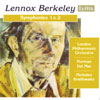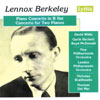Berkeley, L Symphonies Nos 1 & 2
Pioneering Berkeley recordings make a welcome return to the catalogue
View record and artist detailsRecord and Artist Details
Composer or Director: Lennox (Randall Francis) Berkeley
Genre:
Orchestral
Label: Lyrita
Magazine Review Date: 9/2007
Media Format: CD or Download
Media Runtime: 62
Mastering:
Stereo
DDD
Catalogue Number: SRCD249

Tracks:
| Composition | Artist Credit |
|---|---|
| Symphony No 1 |
Lennox (Randall Francis) Berkeley, Composer
Lennox (Randall Francis) Berkeley, Composer London Philharmonic Orchestra Norman Del Mar, Conductor |
| Symphony No 2 |
Lennox (Randall Francis) Berkeley, Composer
Lennox (Randall Francis) Berkeley, Composer London Philharmonic Orchestra Nicholas Braithwaite, Conductor |
Composer or Director: Lennox (Randall Francis) Berkeley
Genre:
Orchestral
Label: Lyrita
Magazine Review Date: 9/2007
Media Format: CD or Download
Media Runtime: 59
Mastering:
Stereo
ADD
Catalogue Number: SRCD250

Tracks:
| Composition | Artist Credit |
|---|---|
| Concerto for Piano and Orchestra |
Lennox (Randall Francis) Berkeley, Composer
David Wilde, Piano Lennox (Randall Francis) Berkeley, Composer New Philharmonia Orchestra Nicholas Braithwaite, Conductor |
| Concertos for Two Pianos and Orchestra |
Lennox (Randall Francis) Berkeley, Composer
Boyd McDonald, Piano Garth Beckett, Piano Lennox (Randall Francis) Berkeley, Composer London Philharmonic Orchestra Norman Del Mar, Conductor |
Author: Arnold Whittall
The first two symphonies are considerable achievements. No 1 (completed in 1940, premiered in 1943) places itself within a field of stylistic attributes in which Walton, Prokofiev, Roussel and even – embryonically – Malcolm Arnold are stronger presences than Sibelius or Vaughan Williams. Both Berkeley’s First and VW’s Fifth were first heard at the Proms in 1943, so it’s notable how different the character of Berkeley’s slow-movement cor anglais solo is to that of VW’s Bunyan-inspired Romanza.
By the time he began work on his second symphony, in 1956, Berkeley would have been very aware of new, radical initiatives – not least connected with his pupils (for example Richard Rodney Bennett and David Bedford) at the Royal Academy of Music. The symphony could even be heard as a measured, thoughtful response to their youthful extravagances – celebrating the virtues of understatement yet providing an object lesson in how degrees of boldness and depth of expression could be tellingly integrated into the design. The work’s virtues are particularly well delineated in this LPO performance under Nicholas Braithwaite, and the remastered recordings offer plenty of atmosphere.
The concertos on the second disc suggest quite different aspects of Berkeley’s musical personality. In the Piano Concerto (1948), the idiom can come close to Rachmaninov-like romanticism – a bold gesture when Bartók would have been a more fashionable model. By contrast, the Two-Piano Concerto begins with almost Coplandesque clangour, and later suggests links with Poulenc and Martinu, affirming that French-based neo-classicism to which Berkeley owed so much. Though the pianos vanish from the action for quite long periods, this still strikes me as a more distinctive contribution to the concerto genre than its solo predecessor. But it’s the disc with the symphonies that offers the best value as a complement to the Chandos Berkeley series – at least as long as the Lyrita reissues remain at full price.
Discover the world's largest classical music catalogue with Presto Music.

Gramophone Digital Club
- Digital Edition
- Digital Archive
- Reviews Database
- Full website access
From £8.75 / month
Subscribe
Gramophone Full Club
- Print Edition
- Digital Edition
- Digital Archive
- Reviews Database
- Full website access
From £11.00 / month
Subscribe
If you are a library, university or other organisation that would be interested in an institutional subscription to Gramophone please click here for further information.




